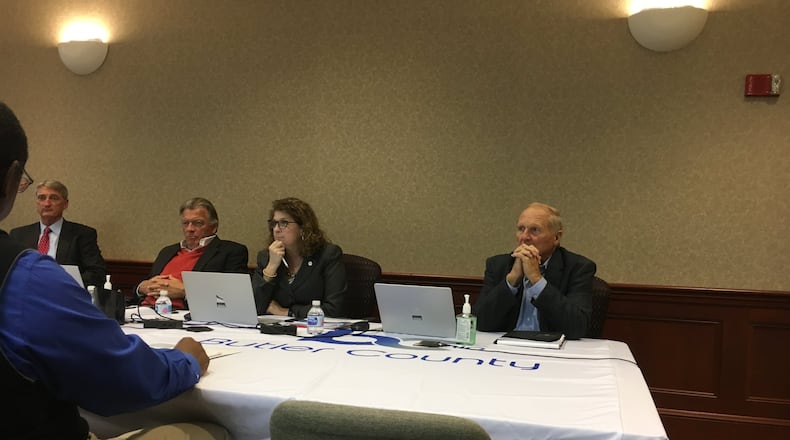Commissioner Don Dixon said he didn’t want to “rain on anybody’s parade” but he wants that money reinstated because they can’t know what the future brings, and he doesn’t want the county to return to the days of mass layoffs and near financial ruin.
RELATED: Butler County payroll program helps control raises, bonuses
“In today’s terms we’re in good shape, but this can change overnight,” he said. “We need to somehow come up with a way to get that funding stream back in place … . I don’t want to go through that again where we had to lay off hundreds.”
Keels told the Journal-News there is $8 million in the budget stabilization fund and she thought with the 20.3 percent — $2 million total — increase for health insurance next year, it made sense to pause budget stabilization funding.
The commissioners will vote on the budget next week.
The presented budget is structurally balanced for the seventh year, meaning the county will not dip into reserves to make ends meet. It is $4 million more than the $98 million commissioners budgeted for this year. Increases in the budget include:
• $1.6 million increase for wages and benefits;
• $1.2 million health for health insurance; and
• $1 million in capital improvements.
“For the most part, our operations are flat,” Keels said. “We’ve, of course, agreed to the two-and-two (performance pay plan) so employee wages and benefits will go up each year. You are aware of the health insurance challenges, and we’re investing more in our infrastructure.”
The total budget, including all funds for next year, is $423 million. While the general fund budget is increasing, the non-general fund budget will drop an estimated $12 million. The general fund is purely taxpayer-backed where some of the other funds have voted levies, like Children Services, or are fueled by user fees like water and sewer.
One major expense for next year Keels did not include in the budget was the new voting machines. The county is receiving $3.2 million from the state to help pay for the aging equipment but the remainder is on the county’s dime. The estimates for the last couple years have been in the $3 million to $6 million range — the Butler County Board of Elections told commissioners during budget hearings they’d likely need $3 million. However, election officials revealed Monday pricing from two of the five state-approved vendors — Dominion and ES&S. Their proposals are $5.1 million and $5.7 million, respectively, for electronic voting machines, which is similar to the voting machines used now. The paper ballot option is $2.3 million and $2.7 million, respectively.
MORE: Butler County doing deep dive researching new voting machines
When the Journal-News shared the information with Keels she said, “we don’t have $6 million sitting somewhere.”
Expenses and revenues for this year both jumped. Revenues are projected to reach $108 million and expenses went up $5 million from the $98 million budget. About $2 million were encumbrances that carried over from 2017 and the rest were increased costs for capital improvements to several county facilities, $600,000 more for boarding prisoners and $215,804 to comply with a new state law that prohibits judges from sending low-level offenders to prison.
Dixon said this virtually unfunded mandate — like so many other funding cuts from Columbus and the federal government — is a fact of life.
“I know we get cuts and it’s not our fault, but it’s our responsibility to deal with it,” Dixon said.
The county is still on track to be general fund debt-free in 2020, a plan instituted in 2015. Prior to that commitment by the commissioners, the debt — that stood at $92 million in 2009 — was scheduled for payments out to 2033. Once the debt is erased the commissioners plan to offer financial assistance to other jurisdictions countywide for economic development endeavors.
The city of Hamilton will be the recipient with a $2.5 million county investment in road work for the mega Spooky Nook sports and conference complex going in at the old Champion Paper Mill on the Great Miami River.
Commissioner T.C. Rogers said because of the debt-free plan, the county will soon own the Government Services Center, the Regional Airport and the fiber optic system.
“Those are valuable assets that will produce economic benefit to the county from now on,” Rogers said.
About the Author
